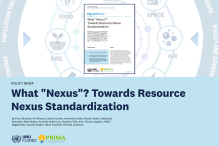Clientelism can be defined as giving material goods in return for electoral support, where the criterion of distribution that the patron uses is simply: did you/will you support me?
A rich literature in political science and economics studies clientelism, including consideration of underlying mechanisms and processes; correlates and contributing factors; and political, social, and economic consequences. While current scholarly work and theories have made important strides in advancing our understanding of the clientelist exchange, there is still limited knowledge on how clientelistic politics affect the poor and influence economic development via state capabilities and electoral politics. This project aims to build and deepen connections between literatures on clientelist politics and economic development, especially with reference to the poorest of the poor – work at the heart of UNU-WIDER’s mandate. Special emphasis is placed on answering the following inter-connected questions:
1) How do clientelistic politics directly affect the poor, especially the poorest of the poor?
2) How do clientelistic politics influence development via impact on state capacity and state-society relations?
3) How do clientelistic politics influence development via impact on electoral politics and policy-making by elected leaders?
The project promotes new conversation among a select group of scholars with diverse disciplinary, regional, and thematic expertise. Project collaborators draw on expertise and ongoing research on clientelism in Latin America, sub-Saharan Africa, and Asia, as well as in cross-country analyses.
The project is expected to produce high quality, policy relevant research in the formof 12 papers that will be published as an edited collection in a journal special issue. The special issue will provide new knowledge on how clientelistic politics affect the poor and influence economic development via state capabilities and electoral politics. This research will be made available to development actors to enhance their knowledge and to strengthen policy analysis, design, and implementation on the topic.
Upon the launch of the UNU-WIDER Work Programme 2019-2023 the research programme was divided into 6 flagship projects. Two years into the work programme these flagships have matured into several standalone projects, of which “Clientelist politics and economic development – theories, perspectives and new directions” originally under “Capable states - building the foundations for achieving SDGs” is one. As of 1 January 2021, this project will be included in Pelikan as its own entry.
- Focal Point
- Rachel M. Gisselquist



